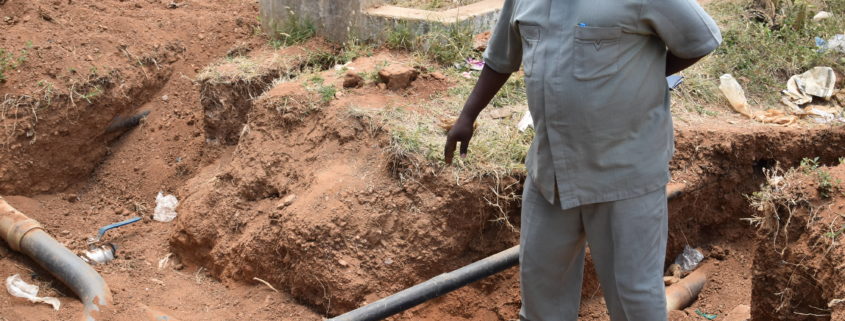Kenyan Steps to Urban Water Supply Sufficiency
Water system coverage in Kenya is concentrated in urban areas, but water supply and service delivery is not always consistent. This is because water utilities that serve these urban areas lose as much as 67 percent of their water to leaks in transmission, poor billing systems, theft and weak metering policies. Also called non-revenue water (NRW), these losses are the difference between the quantity of water produced by a utility and the water that is paid for.
Actions Taken
Working together since January 2016, five water and sanitation companies in eastern Kenya (Kiambere-Mwingi, Kitui, Wote, Mbooni, and Kibwezi-Makindu) and USAID’s Kenya Integrated Water Sanitation and Hygiene (KIWASH) Project developed individualized action plans to reduce NRW losses that deny them income for expanding and improving water services.
Through a series of trainings and strategic planning workshops, the utility staff learned cost-effective techniques that they could implement leading to notable improvements within a period of 6-12 months.
The project’s engineers helped the utilities implement simple techniques including:
- establishing a unit of staff dedicated to periodic monitoring and reporting on NRW indicators,
- installing functional production meters,
- replacing all meters older than eight years, and
- updating the utilities’ metering policies.
Some of the highlighted indicators included time taken to repair leaks and bursts, number of functional district managing areas, percentage of metered connections, integrity of meters, billing cycle, and efficiency of bill payment.
 Results
Results
These efforts are resulting in more efficient distribution of water and increased access for more residents. “People have started demanding our services because they see their neighbor’s taps with water more frequently,” said Stephen Mutiso, Managing Director of Mbooni Water Company. “After repairing all leakages within the pipeline and installing new and efficient meters, customers are getting sufficient water and paying their bills. Our revenue has increased by 100 percent,” he added.
With new awareness on NRW challenges, staff training and establishment of a NRW unit, the utilities are well poised to make affordable changes and infrastructure investments to increase revenue, provide quality services to their customers, extend their water networks, and move towards greater financial sustainability.
KIWASH is working with 11 Kenyan utilities in total to improve governance, operations and financial performance. These changes will improve their ability to qualify for, and take on, debt or equity financing from commercial banks for expansion of WASH services.





Leave a Reply
Want to join the discussion?Feel free to contribute!